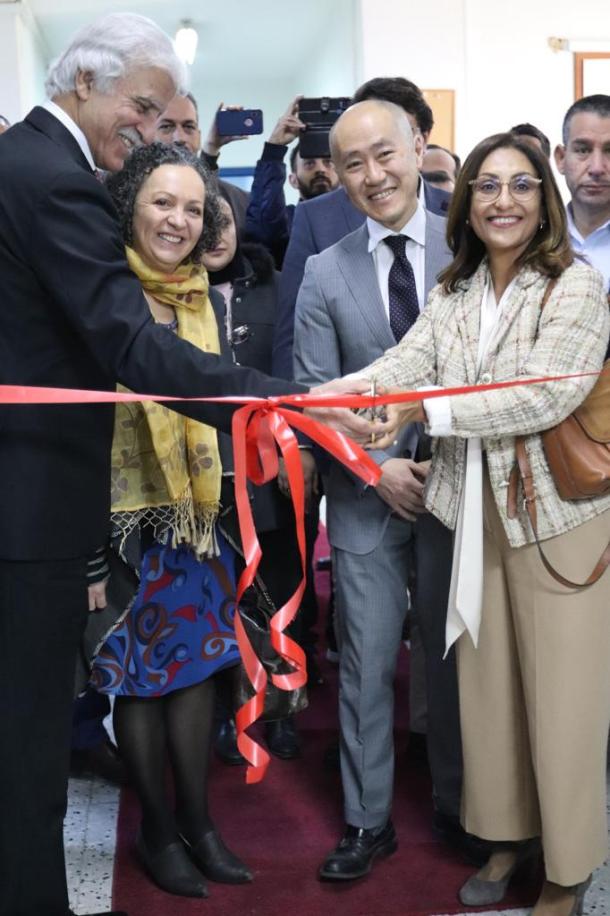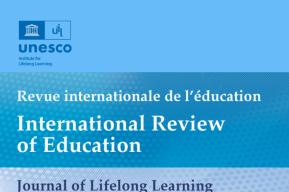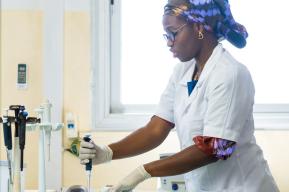News
UNESCO & Ministry of Education inaugurate the Palestine Educational TV Channel

This week, the Palestine Educational TV Channel was launched, marking a significant milestone in improving access to education in Palestine.
UNESCO and the Ministry of Education (MoE) joined forces in response to the challenges posed by the COVID-19 pandemic to develop the Palestine Educational TV Channel to enhance distance learning and ensure continuity of access to education, even during school closures. The project set out to establish a well-equipped and fully operational educational channel by the end of 2022.
Throughout the project, UNESCO supported the construction of the studio and provided TV equipment, including video and audio equipment, a lighting system, a video-wall system, and furniture and fixtures for the studio’s control room.
To ensure the quality of the content being broadcast, UNESCO conducted technical training for TV staff on 2D, 3D, After Effects, TV Engineering and TV Management. Additional training was provided for educational supervisors and teachers on the development of quality educational scripts and videos to enhance the quality of the lessons. The training engaged over 120 MoE staff, who will be the national leads on distance learning through broadcasting.
Launch Ceremony
A launch ceremony was held at the National Institute for Educational Training in Ramallah, when the studio was officially opened by Noha Bawazir, UNESCO Head of Office and Representative, Prof. Dr. Marwan Awartani, Minister for Education, Mr. Takashi Hattori, Deputy Representative of Japan to Palestine, and Ms. Lucia Elmi, Special Representative UNICEF State of Palestine, speaking on behalf of Education Cannot Wait (ECW).
Speaking at the ceremony, Ms. Noha Bawazir said: “UNESCO rapidly adapted its work during the pandemic to ensure that children and youth could still access quality education. We optimized our resources and identified strategic collaborations which would have the most far-reaching, and most sustainable impact. The Palestine Educational TV Channel is a prime example of such a collaboration and partnerships that will ensure access to education for some of the most marginalized children in Palestine far beyond the pandemic. We will keep supporting the Ministry of Education and working towards achieving SDG4 to “ensure inclusive and equitable quality education and promote lifelong learning opportunities for all”, in close collaboration with all education partners.”
Reflecting on the process of developing the channel, H.E. Prof. Dr. Marwan Awartani said: “I want to express my pride in all personnel and staff involved in developing this channel. There was close cooperation between media and academic institutions, and I am thankful also for our partner UNESCO, and the funding from the Government of Japan and Education Cannot Wait, which turned this vision into reality. The Palestine Educational TV is an example of digital transformation in education stemming from the challenges of the pandemic, which has the potential to reach all Palestinians.”
Mr. Takashi Hattori remarked: I am grateful to witness this achievement, to see this new means of education that will benefit children all over Palestine. It will also help teachers, our heroes, tirelessly devoted to educating children, to provide classes in a more effective manner. Indeed, Japan believes that education will build the future of children in Palestine and we will continue supporting this sector.
On behalf of ECW, Ms. Lucia Elmi added: “The COVID-19 pandemic severely disrupted education for many children around the world. Education Cannot Wait is very excited to be part of the educational TV launch as it will enable thousands of boys and girls to access educational resources. It will help transform learning and scale up the quality of basic education, especially for girls and boys in the most vulnerable areas in the State of Palestine. This is a step forward towards digital transformation for the next Education Strategic Sector Plan and how this can bring about change in the life of children.”
The future for inclusive education
Education in Palestine suffered greatly throughout the COVID-19 pandemic which disrupted the learning of 1.28 million students. This disruption to traditional education, however, also accelerated the development of innovative, digitalized approaches to teaching and learning.
Television is one of the most accessible and affordable means of communication for children and young people in Palestine. This means the Palestine Educational TV Channel will be in a position to fulfil the aim of reaching the maximum number of learners and help to ensure that all children, especially those living in remote areas, children with disabilities, sick children and other students facing obstacles reaching school, can access quality education.
The project was funded within the framework of the already existing multi-stakeholder Education Cannot Wait (ECW) Multi-Year Resilience Programme (MYRP) focused on inclusive and sustainable education in emergency contexts, as well as under a new project with funding from the Government of Japan titled “Developing Digital skills and Education for Sustainable Development through Distance Learning in Palestine.”
Palestine Educational TV Channel
Official Opening
UNESCO Head of Office and Representative, Ms. Noha Bawazir, and H.E. Prof. Dr. Marwan Awartani cut the ribbon, joined by Mr. Takashi Hattori on behalf of the Government of Japan and Ms. Lucia Elmi on behalf of ECW.

Inauguration
Ms. Noha Bawazir delivers opening remarks at the inauguration of the Palestine Educational TV Channel.












